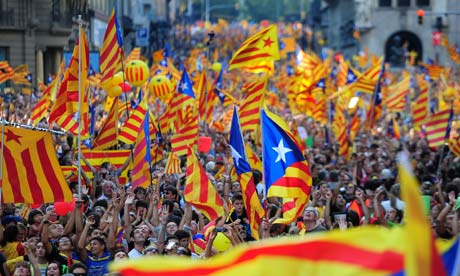Notícia llegida al diari THE GUARDIAN
Catalonia:
a new European state' was the slogan for the march. But statehood
remains a long way off, the EU warns. Photograph: Lluis Gene/AFP/Getty
Images
Barcelona was a sea of red and yellow Catalan flags as more than
1.5 million people brought the city to a standstill on Tuesday at a
mass rally called to demand independence for the Spanish region.
The
planned route was already filled with demonstrators before the march
began, in what marked a watershed for the hitherto marginal independence
movement.
At least one train and more than 1,000 coaches had been chartered to bring supporters to the march.
Long-standing resentment about what Catalans see as their unfairly high contribution to central government has been inflamed by Spain's economic woes. Polls published on Tuesday show support for independence running at 46.4%, twice as high as in 2008, when the financial crisis began.
The
upsurge in support for secession has caught Catalonia's nationalist CiU
government on the hop. CiU, which has governed Catalonia for 25 of the
33 years since democracy was restored, has never aspired to
independence, preferring to wring more autonomy out of minority
governments in Madrid.
Artur Mas, the Catalan president, initially
said he had no intention of joining the march but later said he would
attend in a personal capacity. Carme Forcadell, a spokeswoman for the
group behind the march, said: "Anyone who attends should understand that
they will be considered pro-independence."
Catalan
calls for independence have increased sharply since the financial
crisis exploded in 2008, hitting Spain particularly hard
Speaking on television on the eve of the rally, Mariano Rajoy, the
Spanish prime minister, dismissed the march, saying: "This isn't a
moment for big gestures like this. What we need to do is create jobs."
Carles
Brugueras, a documentary film-maker said he was not a nationalist but
favoured independence from a strictly economic perspective. "For a long
time, Catalonia has been generating a lot of resources for Spain but the
fiscal balance has been very unfair," he said.
Laura Nuñez, a law
student and also a new convert to independence, said she believed it
would boost the Catalan economy. "We're economically the most powerful
part of Spain, because of industry and tourism, and we contribute more
than other Spanish regions," she said. "We shouldn't be subject to this
internal discrimination."
The slogan for the march was "Catalonia: a new European state". But a European Union
spokesman in Brussels pointed out that, were Catalonia to secede from
Spain, it would have to leave the EU and could rejoin only if it met the
economic criteria and if other member states voted unanimously in
favour of its membership.
Whether Catalonia would be viable as an
independent state is an open question. Much of Catalonia's wealth comes
from tourism, but there are major industries in the region, as well as a
significant multinational presence. Whether these firms would want to
remain in a small state that was not part of Spain is unclear.
If
the region continues to pursue independence, boycotts could follow,
analysts warn. There was a damaging cava boycott in 2005, when Catalonia
refused to back Madrid's bid for the 2012 Olympics.
The economist
Xavier Cuadras warned: "A large-scale boycott could cause a 40% drop in
exports of consumer goods to Spain, and a sustained boycott could cost
Catalonia 4% of its GDP." Spain accounts for 54% of the region's
exports.
In sport, Catalans make much of the fact that half the
victorious Spanish football team are Catalans. But it is doubtful
whether many of those players would play for a small country that was
unlikely to win anything at an international level. The same goes for
the mighty Barcelona football club: if Catalonia were independent, it
would be reduced to playing in a semi-professional league.
And not
all Catalans are pro-independence. Some 40% of Catalans are Spanish
immigrants – or the children of those immigrants – who fled poverty in
rural Spain after the civil war and retain strong family and emotional
ties with Spain. Then there are a further 1 million people (14% of the
population) who are from other EU states, Latin America, Morocco,
Pakistan and China. Very few of these, were they given the chance to
vote, would back independence.
There is considerable antipathy in
Spain towards the Catalans, who are widely perceived as rich, spoilt,
constantly complaining and forever playing the victim. Catalans are,
understandably, hurt by this. "The rise in the pro-independence movement
is directly related to the Spanish state's inability to include
Catalonia," said Miquel Berga, professor of English literature at the
Universitat Pompeu Fabra. "It seems to me that only a profound change in
constitutional arrangements can address the prevailing sense of
dissatisfaction."
Joan Fumaz, a chef, said: "If we were
independent, we wouldn't have to go on justifying ourselves. I'm
Catalan. It would be nice not to have to explain that to people all the
time."





0 comentarios:
Publicar un comentario